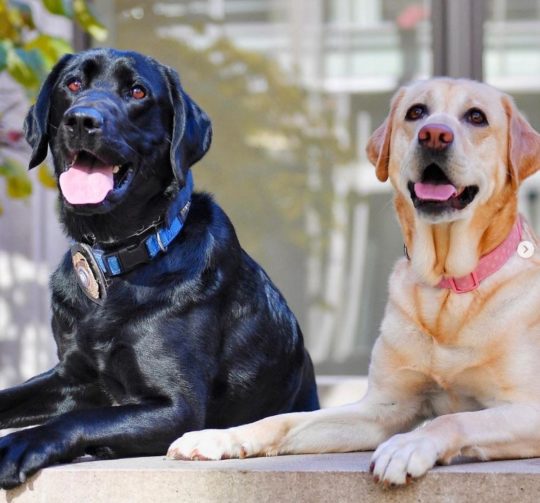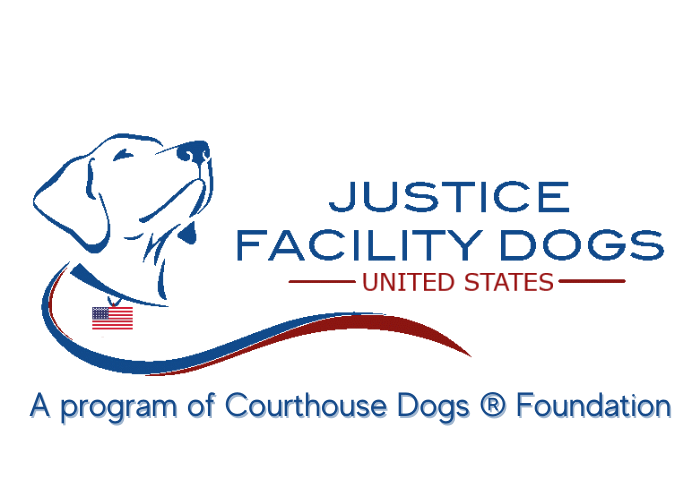 Justice Facility Dogs in Connecticut
Justice Facility Dogs in Connecticut
These agencies have professional handlers working with certified facility dogs in Connecticut.
Colchester Police Department (PBB)
Middletown Police Department (PBB)
Naugatuck Police Department (PBB)
Torrington Police Department (PBB)
Town of Groton Police Department(PBB)
University of Connecticut Police
Department – 2 dogs (CCI)
University of Southern Connecticut Police Department (PBB)
Waterford Police Department (PBB)
Yale Police Department (PBB)

Facility dogs Carson and Tildy, trained by Canine Companions
Appellate Court Decision
State v. Devon D. (2016)
321 Conn. 656 (2016)
Full text of the opinion here.
Supreme Court of Connecticut, June 14, 2016.
Nature of case:
Devon D. was convicted of 11 counts of sexual offenses. The alleged victims were one of his daughters and two of his sons.
Procedure in the trial court:
The prosecutor asked permission to have a “therapy dog” sit near the daughter while she testified. The prosecutor cited a statute authorizing special procedures for child witnesses in abuse cases, Connecticut General Statutes § 54-86g. The prosecutor also argued that the court had inherent authority to allow this. The prosecutor explained that the girl did not have any concerns about testifying in front of the defendant, but she was concerned about the presence of other people.
The judge held an evidentiary hearing on this request. At the hearing, the prosecutor offered testimony from a child therapist who had met the girl the previous day. The girl had told him that she would feel more comfortable if Summer was with her when she testified. The therapist testified that the girl would be more likely to talk about her experiences if the dog were present.
The judge concluded that the presence of the dog would assist the witness in testifying. This would prevent the need for the “more drastic and onerous” procedure of video recording her testimony. The defendant’s rights would not be prejudiced by this procedure.
During the trial, Summer sat near the girl when she testified. Summer was placed in a position where she could not be seen by the jury.
Jury Instructions:
“Testifying in open court before a crowd of strangers is an unfamiliar and stressful event for most people. In order to reduce that anxiety, I have allowed the presence of a service dog in the courtroom during the testimony of one of the witnesses I anticipate we’ll soon hear. You are to disregard the presence of the service dog. You are not to credit the witness’s testimony, in any way, simply because of the presence of the dog. You are to draw no inference for or against any witness using a service dog. Sympathy and emotion play absolutely no part of your consideration and eventual deliberation. You are to attach no significance whatsoever to the presence of the dog. Her being with the witness is merely a tool that I decided to use to promote a more calming supportive setting for this witness.
The witness is anxious about testifying in front of a group of people. The dog is not present due to any concern that the witness has with the defendant’s presence. The service dog met the witness this past Friday in preparation for the trial. Think of the dog as an interpreter, like an aid to get the witness’s testimony across to you more clearly.”
Appellate decision:
The use of a dog is not one of the procedures authorized by § 54-86g. A trial judge nonetheless has inherent discretionary authority to allow that procedure.
In exercising this discretion, “the court must balance the extent to which the accommodation will help the witness to testify reliably and completely against any possible prejudice to the defendant’s right to a fair trial. The trial court should consider the particular facts and circumstances for the request to have a dog accompany the particular witness, the extent to which the dog’s presence will permit the witness to testify truthfully, completely and reliably, and the extent to which the dog’s presence will obviate the need for more drastic measures to secure the witness’ testimony. The trial court should balance these factors against the potential prejudice to the defendant and the availability of measures to mitigate any prejudice, such as limiting instructions and procedures to limit the jury’s view of the dog.”
Applying these standards, the trial judge properly exercised his discretion in allowing Summer to be present during the daughter’s testimony. The judge properly found that her testimony would be assisted by Summer’s presence. The judge also properly concluded that the use of the dog reduced the need for “more drastic measures.” The judge took appropriate steps to prevent unnecessary prejudice to the defendant.
The defense argued that the use of a dog can be allowed only on a showing of “compelling need.” The Supreme Court rejected this argument. The “compelling need” standard applies when a procedure infringes on a defendant’s right to confront witnesses. The use of a dog during a witness’s testimony does not affect that right.
ADI Accredited Organizations
The following organizations place facility dogs in the state of Connecticut. Please visit their websites to find out more about each organization.

